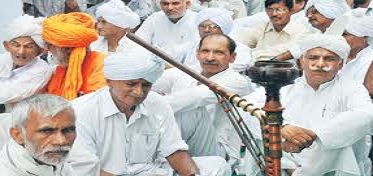IAS PRELIMS/HCS MAIN EXM 2013 FREE STUDY MATERIAL-I
MOST IMPORTENT STUDY MATERIAL FOR IAS PRE /HCS MAIN EXAM 2013
SOME NEW DEVELOPMENTS IN PANCHAYTIRAJ INSTITUTIONS 2012
During the meeting, the issues discussed related to proper status of State election commissions,
reasonable autonomy to them,
availability of sufficient financial powers,
funds and manpower to SECs,
vesting of powers of Civil Courts on State Election Commissioners,
on-line voting,
curbing of the practice of paid news carried by print and electronic media etc
e-Governance of Panchayats
 The Ministry of Panchayati Raj is implementing the e-Panchayat Mission Mode Project (MMP) that addresses all core aspects of Panchayats’ functioning viz. Planning, Monitoring, Implementation, Budgeting, Accounting, Social Audit, etc.
The Ministry has instituted an annual e-Panchayat award for the best performing States to recognize and encourage States to adopt the PES applications, which is given on the National Panchayati Raj Day every year . During the year 2011-12, the Ministry of Panchayati Raj also disbursed Rs. 38.5 crores to States for setting up Programme Management Units (PMUs) at State and District levels for providing technical and hand holding support to ensure effective and timely roll out of the e-Panchayat MMP.
Rashtriya Gaurav Gram Sabha Awards 2012
The “Rashtriya Gaurav Gram Sabha Purskar, 2012†was awarded to 16 best performing Gram Panchayats and 170 Panchayats were felicitated representatives of with “Panchayat Sashaktikaran Puraskar†on the occasion of 3rdNational Panchayati Raj Day. Four awards were given to Kerala, Karnataka, Maharashtra and Sikkim for cumulative raking and four awards were given to Maharashtra, Haryana, Rajasthan and Karnataka for incremental ranking.
Â
Road Map for Panchayati Raj
 The national level plan for improving the functioning of PRIs is chalked out in the Roadmap for Panchayati Raj (2011-2017). It contains a series of recommendations for a wide number of issues in Panchayati Raj. It highlights key aspects for empowerment, enablement and accountability of the PRIs for better governance and faster development including devolution of functions, funds and functionaries as envisaged in the Constitution, Capacity Building of the Panchayats and Functionaries, decentralized planning, effective implementation of PESA, empowered elected village councils in the Sixth Scheduled Areas and changes in the constitutional and legal framework.
This national Roadmap is enabled and assisted by the Government by the provision of funds under several schemes. The Backward Regions Grant Fund (BRGF) provides untied grants to the Panchayats in the backward regions in order to reduce development deficits of the country, with the requirement that the District Plans for utilization of the grant be prepared by the involvement of the Gram Sabhas.  The Rashtriya Gram Swaraj Yojana (RGSY) which aims at Capacity Building and Training of the Elected Representatives of Panchayati Raj Institutions as well as the Functionaries.
Panchayat Mahila Evam Yuva Shakti Abhiyan(PMEYSA)
 The Panchayat Mahila Evam Yuva Shakti Abhiyan (PMEYSA) aims to empower Elected Women Representatives (EWRs) by knitting them into networks and through group action so that their participation and representation on local governance issues improves. The scheme aims to enable them to articulate their problems as women Panchayat leaders and discuss issues regarding the institutional mechanisms for their empowerment, to build the confidence and capacity of EWRs, so that they get over the institutional, societal and political constraints that prevent them from active participation in rural local self governments and to enable them to come up with a charter of issues to be mainstreamed into policy and advocacy support so that their concerns are addressed by the process of development adopted by the State and the three-tier Panchayat system. Activities under PMEYSA include holding State Sammelans and Divisional/ District level Sammelans of EWRs, formation of their associations, setting up of State support Centres and sensitization programmes for EWRs and Elected Youth Representatives (EYRs).
 Financial Support to Panchayats
 The Ministry of Panchayati Raj (MoPR) provides financial support to the States under the Rashtriya Gram Swaraj Yojana (RGSY) for taking up construction of the Gram Panchayat buildings for which the State/Year-wise details are enclosed at Annexure. In addition to RGSY, MoPR also provides funds to States under the Backward Regions Grant Fund (BRGF) which are in the nature of untied grants for Panchayats to undertake works based on felt local needs. Many States have taken up construction of Panchayat Ghars under BRGF. Funds from Mahatma Gandhi National Rural Employment Guarantee Act (MGNREGA) have also been provided for Bharat Nirman Rajiv Gandhi Sewa Kendras. As per information available, construction of 872 BNRGSKs have been completed during 2010-11 whereas the figure during 2011-12 and 2012-13 (as on 27.11.2012) as reported by the states were 5886 and 3296 respectively.
Expert Committee to Examine Panchayats for More Efficient Delivery of Services
 An Expert Committee to examine how Panchayats could be leveraged for more efficient delivery of public goods and services was constituted under the Chairmanship of Shri Mani Shankar Aiyar, Union Minister of Panchayati Raj to review the existing policy and guidelines of relevant Central Sector/Centrally Sponsored Schemes dealing with social sector / anti poverty programmes and to give specific recommendations (a) for an appropriate role & responsibility of Panchayats at different levels based on the principle of subsidiarity, (b) for strengthening their capacity to deliver services and (c) for making them accountable to respective Gram Sabhas and  to  flag the constraints that may come up in operationalising the delivery system through the PRIs and suggest ways and means of dealing with the same and to suggest ways to incentivize States to devolve three Fs i.e. Funds, Functions and Functionaries to Panchayats.















